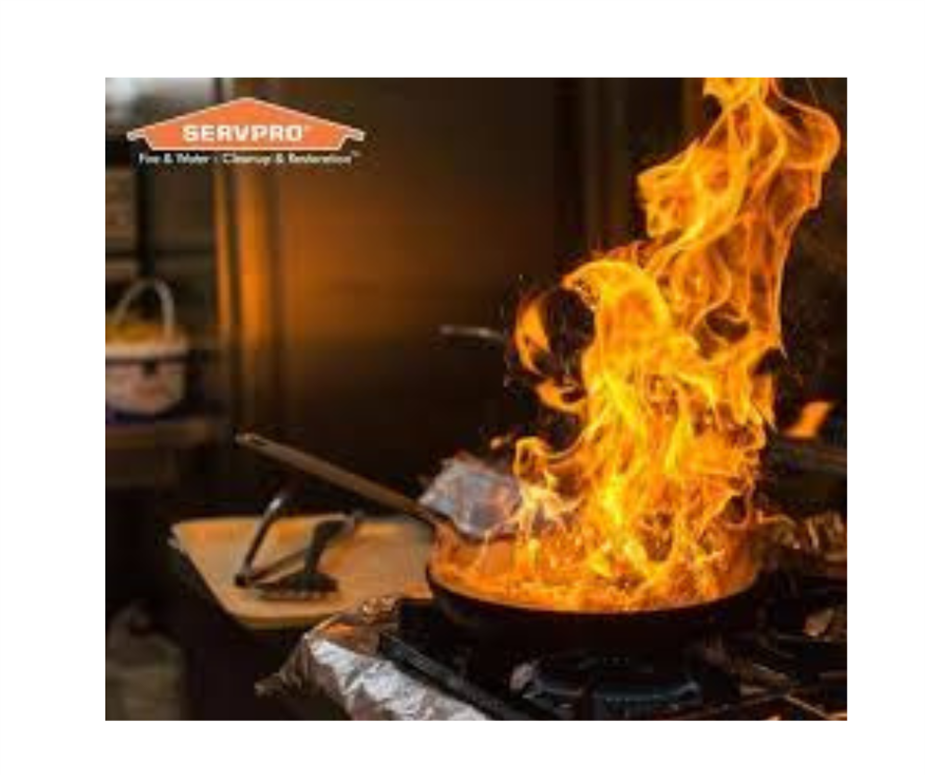Preventing Kitchen Fires in Hyannis, MA
7/1/2024 (Permalink)
 Kitchen fires are a common hazard that can be avoided by taking the proper precautions. Fire Damage and smoke damage require professional remediation.
Kitchen fires are a common hazard that can be avoided by taking the proper precautions. Fire Damage and smoke damage require professional remediation.
Very few things are quite as devastating as a kitchen fire. However, if the proper precautions are taken, kitchen fires shouldn’t be a worry. In both home and commercial kitchens, eliminating fire hazards should be a top priority. There are some fire prevention methods unique to each kind of kitchen and methods that can be practiced both at home or in a restaurant. SERVPRO of Mid-Outer Cape Cod have a few tips to keep your kitchen safe during this scorching hot Cape Cod summer.
Home Fire Prevention
- Update the Fire Extinguisher: Most homeowners likely have a fire extinguisher handy somewhere in the kitchen. Fortunately, they are seldom used in most kitchens. However, this likely means the extinguisher has been sitting for a while and is years past its last useful date.
Updating your extinguisher will keep you prepared for most emergency home fire scenarios. - Properly Put Out Grease Fires: Many people know that putting water on a grease fire will only make the situation worse, but don’t actually know how to properly extinguish one. First, cover the flames with a pot/pan cover or baking sheet. For smaller fires, suffocate the flames by pouring baking soda on them. If all else fails, use a chemical fire extinguisher (class B). This will likely ruin your appliances but may just prevent the fire from spreading.
- Clean Stovetop Burners: Whether or not your burners are metal or glass, use benign, non-toxic cleaners to clean them. One old but undeniably good stovetop-cleaning agent is simply white vinegar, baking soda and water in a spray bottle. Using this as a cleaner prevents toxic and flammable chemicals from building up on burners and possibly causing a fire.
- Don’t Leave an Unattended Stovetop: According to the National Fire Protection Association, the leading cause of household kitchen fires are caused by unattended cooking appliances[1]. Always keep an eye on your stove and be sure to check in on your oven and microwave regularly when they are in use.
Commercial Kitchen Fire Prevention
- Mise En Place: There’s a phrase common in the cooking world, “Mise en place”. The phrase means that every ingredient, cooking tool and item a cook uses must be organized and clean. Not only does this get meals out fast and efficiently, but it also greatly lowers the risk of a kitchen fire. If everything is in its place, injuries, slips, contamination and the misplacement of scolding hot cookware can all be prevented.
- Clean Grease Traps and Hood Vents Regularly: There’s nothing a dishwasher hates more than being handed hood vents to clean that are caked in a year’s worth of grease and grime. Even worse than that is the high probability of a grease fire if those vents remain uncleaned. Aim to clean the vents at a bi-weekly pace and dry them completely before reinstalling.
- Be Cautious of What Gets Thrown Away: If you’ve made a mistake cooking, don’t throw it out right away. Any hot items that need to be discarded should be put aside to cool down. Trash cans could possibly melt or catch fire if hot items are carelessly disposed in them.
- Never Leave a Functioning Kitchen Unattended: Just like you would at home, making sure the kitchen is always supervised is the single most important fire prevention method. Also, make sure to set timers for everything that enters your oven. Often times prep cooking, items can get left in restaurant ovens without a timer, causing them to char and catch fire. Also, be sure to make sure all out of use burners are off.
If Your Kitchen Catches Fire
If the worst has happened to your home or commercial kitchen, call the restoration experts at SERVPRO of Mid-Outer Cape Cod. We’re on alert 24/7 for your fire damage and smoke damage emergency. We’ll get you back home and back to work faster than any other restoration crew on Cape Cod. From Mashpee to Provincetown, SERVPRO is your local crew for all things restoration.
[1] https://www.nfpa.org/news-and-research/data-research-and-tools/us-fire-problem/home-cooking-fires






 24/7 Emergency Service
24/7 Emergency Service